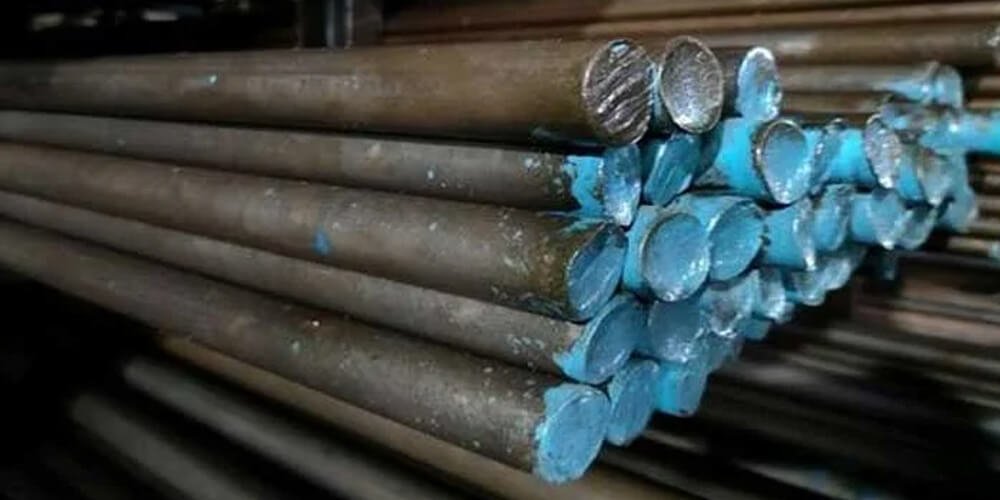40CrNiMoA Special Alloy Steel Manufacturers in Mumbai | Industrial Grade
Titan Steel a trusted 40CrNiMoA Special Alloy Steel Manufacturers in Mumbai offering premium-quality alloy steels for automotive, aerospace, construction, and industrial applications. Get corrosion-resistant, durable, and precisely engineered alloy steels with competitive pricing and timely delivery from reliable suppliers in Mumbai.
40CrNiMoA Alloy Steel: Comprehensive Overview
40CrNiMoA is a high-strength, low-alloy steel known for its excellent mechanical properties, including high tensile strength and good toughness. It is commonly used in demanding applications that require superior wear resistance and durability.
Introduction to 40CrNiMoA Alloy Steel
40CrNiMoA is an alloy steel comprising chromium, nickel, and molybdenum, which contribute to its enhanced performance characteristics. The combination of these alloying elements results in a steel with robust mechanical properties, making it suitable for a variety of high-load applications.
Key Features of 40CrNiMoA Alloy Steel:
- High Strength: Offers superior tensile and yield strength.
- Wear Resistance: Enhanced by chromium and molybdenum.
- Toughness: Maintains good impact resistance and ductility.
- Hardness: Achieved through controlled heat treatment.
Applications of 40CrNiMoA Alloy Steel
40CrNiMoA is widely used in industries where high strength and durability are crucial. Typical applications include:
Typical Applications:
- Automotive: Gears, shafts, and crankshafts.
- Industrial Machinery: High-load bearings, spindles, and components for heavy machinery.
- Oil and Gas: Drilling equipment, pressure vessels, and structural components.
- Engineering: Tools, dies, and high-stress structural elements.
Equivalent Grades of 40CrNiMoA Alloy Steel
40CrNiMoA is recognized under various international standards. Its equivalents are:
| Standard | Equivalent Grade |
|---|---|
| DIN | 1.6511 |
| EN | 40CrNiMoA |
| AISI/SAE | 4140 |
| BS | 817M40 |
Chemical Composition of 40CrNiMoA Alloy Steel
The chemical composition of 40CrNiMoA is critical for achieving its desired properties. The typical composition is as follows:
| Element | Composition (%) |
|---|---|
| Carbon (C) | 0.36 – 0.44 |
| Silicon (Si) | 0.20 – 0.35 |
| Manganese (Mn) | 0.50 – 0.80 |
| Phosphorus (P) | 0.035 max |
| Sulfur (S) | 0.035 max |
| Chromium (Cr) | 0.90 – 1.20 |
| Nickel (Ni) | 0.80 – 1.20 |
| Molybdenum (Mo) | 0.15 – 0.30 |
This composition ensures a balanced combination of strength, toughness, and wear resistance.
Mechanical Properties of 40CrNiMoA Alloy Steel
The mechanical properties of 40CrNiMoA are crucial for its performance in various applications. The following table summarizes these properties:
| Property | Value (Typical) |
|---|---|
| Tensile Strength (MPa) | 850 – 1000 |
| Yield Strength (MPa) | 600 – 800 |
| Elongation (%) | ≥ 15 |
| Impact Toughness (J) | ≥ 40 (at room temperature) |
| Hardness (HB) | 200 – 250 |
These properties reflect the steel’s ability to withstand high stresses and impacts.
Heat Treatment of 40CrNiMoA Alloy Steel
Proper heat treatment is essential for achieving the desired mechanical properties of 40CrNiMoA. Common heat treatments include:
- Hardening: Heat to 850 – 880°C and quench in oil or water to increase hardness.
- Tempering: Heat to 550 – 650°C after hardening to improve toughness and reduce brittleness.
- Normalizing: Heat to 850 – 880°C and air cool to refine grain structure and enhance toughness.
These treatments help tailor the steel’s properties for specific applications.
Hardness of 40CrNiMoA Alloy Steel
The hardness of 40CrNiMoA can be adjusted through heat treatment processes. Typical hardness values are:
- Annealed Condition: 190 – 210 HB
- After Hardening and Tempering: Up to 55 HRC
These values indicate the steel’s capability to resist wear and deformation under load.
Physical Properties of 40CrNiMoA Alloy Steel
The physical properties of 40CrNiMoA are important for its stability and performance. The following table summarizes these properties:
| Property | Value |
|---|---|
| Density (g/cm³) | 7.85 |
| Melting Point (°C) | 1420 – 1460 |
| Thermal Conductivity (W/m·K) | 45 |
| Specific Heat Capacity (J/kg·K) | 460 – 480 |
These properties ensure stability and performance in various operating conditions.
Forging Properties of 40CrNiMoA Alloy Steel
40CrNiMoA can be forged at temperatures ranging from 1150 – 1250°C. It is important to cool the forged components slowly to avoid internal stresses and maintain dimensional stability.
Stress Relieving for 40CrNiMoA Alloy Steel
Stress relieving involves heating the steel to 600 – 650°C to remove residual stresses from machining or forming. This process improves dimensional stability and reduces the risk of deformation.
Normalizing 40CrNiMoA Alloy Steel
Normalizing is performed by heating the steel to 850 – 880°C and allowing it to cool in air. This process enhances toughness and refines the grain structure.
Annealing 40CrNiMoA Alloy Steel
Annealing involves heating the steel to 680 – 720°C and cooling it slowly in the furnace. This process improves machinability and prepares the steel for further heat treatments.
Machinability of 40CrNiMoA Alloy Steel
40CrNiMoA alloy steel exhibits good machinability, particularly in its annealed condition. It can be machined into complex shapes with standard cutting tools, although care should be taken to manage tool wear during high-hardness operations.
Welding of 40CrNiMoA Alloy Steel
Welding of 40CrNiMoA is feasible with proper preheating (to about 150 – 200°C) and post-weld heat treatment. Following appropriate welding procedures helps prevent issues such as cracking or reduced toughness.
Titan Steel & Engineers Related Products:
Carbon Steel, Alloy Steel, Bright Steel, Spring Steel, Die Steel & Tool Steel, Special Alloy Steel
For Visit us Maps
Supply Cities
- Mumbai
- Ahmedabad
- Amaravathi
- Ambattur
- Bangalore
- Belgaum
- Chennai
- Chittoor
- Coimbatore
- Dindigul
- Mysore
- Nellore
- Hyderabad
- Kochi
- Mangalore
- Tirupur
- Tuticorin
- Madurai
- Andhra Pradesh
- Karnataka
- Puducherry
- Kerala
- Tamil Nadu
- Telangana
- Visakhapatnam
- Kochi
- Kerala
- Hubli-Dharwad
- Karnataka


